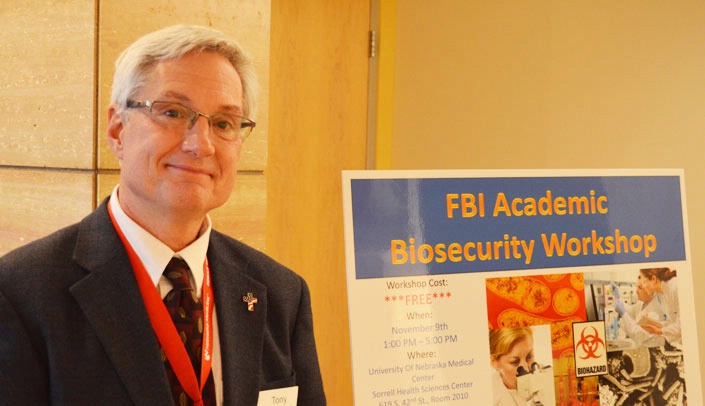UNMC hosted an FBI academic biosecurity workshop on campus last week.
The goal of the workshop was to enhance communication and cooperation among law enforcement agencies, public health departments, and research institutions to mitigate potential biosecurity issues that may affect public health and safety.
Members of law enforcement agencies, private pharmaceutical companies, UNMC campus leaders and others attended the four-hour event, which included the discussion of different biosecurity risks, roles and responsibilities of law enforcement agencies and research institutions. The workshop was designed to identify potential obstacles to improve cooperation.
Assistant Special Agent in Charge Jim Langenberg gave opening remarks, and Policy and Program Specialist William So, Ph.D., of the Weapons of Mass Destruction (WMD) Directorate, led the workshop.
“One of the priorities for the FBI is to make sure we reach out to all the select agent facilities, and we’re looking for champions to support the messaging and the building of relationships,” Dr. So said.
Anthony Sambol, assistant director of the Nebraska Public Health Laboratory (NPHL) at UNMC, reached out to FBI Special Agent Jim Stefanski, a WMD coordinator in the bureau’s Omaha office, to offer to host the training.
“It was a good opportunity, and the fact that UNMC is actually one of the three Ebola treatment centers in the United States, we thought it was really important that we get this accomplished,” Stefanski said.
Sambol said he learned about the FBI presentation through a listserv he participates in with the American Biological Safety Association (ABSA).
“It’s important that we work together as a community,” Sambol said. “It’s important that we have all the players together to understand what’s going on, to talk about these sort of things, to prepare in case there is an incident.”
Sambol said the presentation was a success, with workshop discussions of several biosecurity scenarios.
“I was very happy with the presentation and very excited with the scenarios,” he said. “I thought they provoked a lot of discussion and communication among the different agencies, with lots of different points of view.”
UNMC had representatives from the safety and security department, ITS, business and finance, faculty members and academic leaders at the event.
“These are people who would all be involved if an incident with one of these high pathogen biological agents would happen,” Sambol said.
